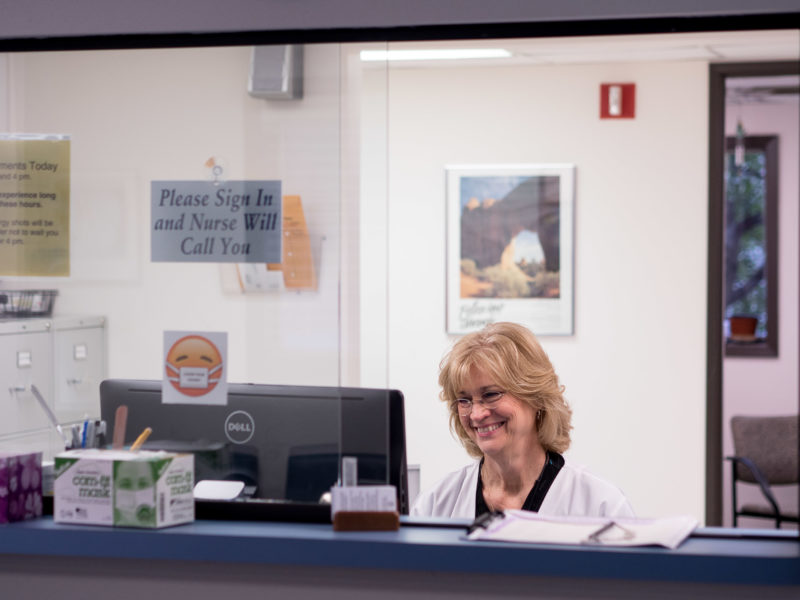Because of the recent increase in clients, Counseling Services has increased their walk-in hours for students. For the first time in decades, first-time clients have an opportunity to visit the offices between 1:30 and 4:30 p.m., as opposed the original 3:00 to 4:30 p.m. time slot.
“Some days, we’d have five or six students come, and we couldn’t see them all in an hour and a half, but with three hours, we’re hoping not to have to say to anybody, “˜Come back tomorrow,'” said Richard Reams, associate director of Counseling Services.
Reams believes that the cause of the increase is the pressure on students by their family or their community to do more than they can handle.
“I think the great recession of 2008 was very stressing to parents, and they started to really worry about the future for their sons and daughters. I think that anxiety transferred to students to do really well. My theory is that there is an increasing pressure on students now given the economy, and there is a pressure from home that they got to do really well and that options for the future are narrowing,” Reams said.
Sheryl Tynes, vice president for Student Life, speculates that, along with pressure to do better, the increase in students is a national epidemic not specific to Trinity.
“I don’t think that Trinity is alone in that nationally, there is a greater demand for counseling services. There’s less stigma attached to seeking help for mental health than there was even 10 years ago,” Tynes said.
Counseling Services has also added a doctoral student in counseling psychology from Our Lady of the Lake University, Aisha Zarb-Cousin. Zarb-Cousin is a licensed professional working on her doctorate and will see roughly 12 students a week. The department has also requested an additional full-time counselor.
“It’s an adjustment for us. Every change brings improvements and complications. We think it will work well,” Reams said.
“We do have busier times of the day, but our census is not up. We have a trending graph, and from year to year, it can go up or down a few students, but it’s generally pretty stable,” said Jackie Bevilacqua, coordinator of Health Services.
October and February tend to be busier times for the office, as well as around finals and midterms, but the staff is able to see students as they come. Health Services tends to around half of the student body “” roughly 4,500 visits a year.
“A couple of years ago, we reconfigured our spaces, so when physicians are here, we can have another place to examine walk-in students. Over the years, we’ve added more physicians; we have 20 hours a week of physician time. We don’t have long waiting lists to see the doctor, and most of our clinics aren’t really too full,” Bevilacqua said.
Health Services provides gynecology exams, birth control, STD testing “” which can be done without an appointment and at any time “” and vaccinations, such as the flu vaccine or HPV vaccine.
“Health Services is not just a place to go when you are sick or when you’re injured,” Bevilacqua said.
Although Health Services hasn’t had a the same spike in clients as Counseling Services, both departments treat a large part of the Trinity community. Both maintain walk-in hours as well as scheduled appointments and ensure complete confidentiality.
“I would like students to know that these are the two areas on campus where anything you share with them, they cannot share with anyone else. It is 100 percent confidential when students share [information] with [Counseling Services and Health Services]. [Counseling Services and Health Services] can lose their license if they share, because counselors have a strict rule for confidentiality. If a student were to come to me, or another faculty member on campus, we’re mandatory reporters. We would have to report,” Tynes said.
By acknowledging the influence of academics on health and vice versa, both services are better equipped to handle the increase in students on campus.
“I think that it’s a good thing that we recognize Trinity students as whole people. You have a physical health and a mental health. Things that happen academically impact both of those. Both of these offices are a way for us to treat you all as whole people. It’s a two-way street in terms of causation. We’re very mindful of that,” Tynes said.
Trinity supports students by promoting self-care and providing many opportunities to seek professional help. Tynes suggests that students put themselves first in order to have stronger academic and social careers.
“If you’re not functioning, you cannot help anybody else. You have to take care of yourself and sometimes drown out the world,” Tynes said.







